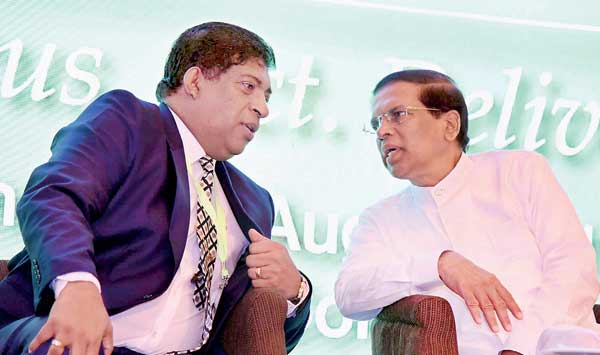03 Aug 2016 - {{hitsCtrl.values.hits}}

Finance Minister Ravi Karunanayake and President Maithripala Sirisena in conversation at the Sri Lanka Economic Summit 2016 which kicked off yesterday at the Cinnamon Grand Hotel, Colombo PIC BY KITHSIRI DE MEL
The government’s financial policies and management should be more disciplined and take into consideration all stakeholders of the country’s economy, President Maithripala Sirisena said yesterday at the Sri Lanka Economic Summit 2016 organized by the Ceylon Chamber of Commerce. “There has been a great deterioration of the government’s f ina n c i a l di s c i p l i n e and management. Both local and foreign funds have not been used or invested properly and there has been corruption and mismanagement.
This has resulted in a financial crisis,” he said. He noted that the pas t governments have placed Sri Lanka in a Rs. 9 trillion debt trap. “So to come out of this, government policy must have c o m p r e h e n s i v e f i n a n c i a l discipline and management, while the private sector and the public must act with understanding. Only then can we raise our head as a country,” he said. However, he said that Sri Lanka may not be able to emulate model economies in the Asian region.
“The masses, the private sector, and the public sector ask us if we can mould our country like a model country in the region. But there are many differences in the political processes between our country and the countries in the region when compared,” he said. While acknowledging the deteriorating foreign inflows and a massive trade deficit, he noted that welfare payments must and would be continued, in order to strengthen small and medium scale enterprises (SMEs) to export levels
“There is no room for us to remove welfare. We want to strengthen local industries by giving them welfare payments and subsidies. I believe that strengthening small and medium scale businesses and giving them guidance should be given greater emphasis by the government,” Sirisena added. He noted that SME contribution to the economy, which is at 8-10 percent of the gross domestic product (GDP), should increase by another 20 percent. SMEs make up over 70 percent of the businesses in the country. However, Sirisena added that the private sector has been lobbying him to give relief, particularly with regard to the recently increased taxes, and to improve government processes, in order to engage more in the economy. However analysts have repeatedly pointed out that Sri Lanka was struggling to give welfare levels of a Nordic country with taxes of a South Asian country. “A wide section of the private sector has also been saying that they have the capacity to invest and strengthen the economy, but they also need tax and other type of reliefs,” he said. He asked government officials to continue welfare payments while also to take the requests of the private sector into account when formulating financial and economic policies. “Minister, (Finance Minister Ravi Karunanayake), I believe that government financial management should operate in a way where those who contribute a lot to the economy, like members of the Ceylon Chamber of Commerce. They should be given more freedom to participate in strengthening the economy by providing them relief,” he said. However, Finance Minister Ravi Karunanayake is currently attempting to increase taxes from 12.1 percent of GDP in 2015 to 14 percent of GDP this year in order to service government debt. The International Monetary Fund’s US$ 1.5 billion relief to address Sri Lanka’s balance of payment crisis includes a host of economic reforms including a stricter tax regime.
President Sirisena instead proposed that taxes be collected from businesses that are not paying, while not pestering those who have always been paying them. Meanwhile, President Sirisena said that the country must take advantage of the maritime and tourism resources and potential which have been not tapped into in the past decades.
He had made an impressive policy speech at the previous edition of the Sri Lanka Economic Summit, saying that policy consistency is more important that political consistency. However, the ensuing year saw investors heavily criticizing policies, which were being changed in an almost weekly basis.
26 Nov 2024 3 hours ago
26 Nov 2024 4 hours ago
26 Nov 2024 5 hours ago
26 Nov 2024 6 hours ago
26 Nov 2024 6 hours ago